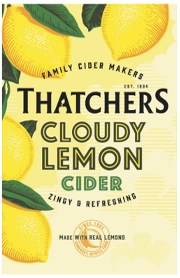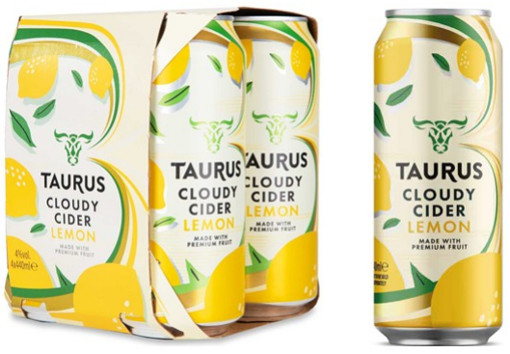Cheers to the latest UK trademark dispute: Another round of… cider!

In the latest legal wrangle between a brand owner and a supermarket chain in the UK, the Thatchers Cider company has successfully challenged Aldi’s lookalike Taurus Cider. Farhan Kazi provides the background to the trademark dispute and explains why it is good news for market leaders.
In January, the Court of Appeal of England and Wales handed down its judgement in the trademark dispute between Thatchers Cider Company Ltd and Aldi Stores Ltd (Thatchers v Aldi). Brand owners may be overjoyed to hear that the Court of Appeal found that Aldi’s use of its Taurus Cloudy Cider had infringed Thatchers’ Cloudy Lemon Cider trademark in the UK.
Background to the cider trademark dispute
 Founded in 1904 in Somerset, UK, Thatchers produces and sells cider. It launched its Thatchers Cloudy Lemon Cider in 2020 and holds a UK trademark registration for the mark (pictured right) for ‘cider; alcoholic beverages, except beer’ in class 33.
Founded in 1904 in Somerset, UK, Thatchers produces and sells cider. It launched its Thatchers Cloudy Lemon Cider in 2020 and holds a UK trademark registration for the mark (pictured right) for ‘cider; alcoholic beverages, except beer’ in class 33.
Aldi is a well-known discount supermarket and often uses ‘benchmarking’, identifying a product (usually a market leader), when developing a similar Aldi product, leading to multiple trademark infringement cases. Aldi has sold cider under the Taurus name since 2013 and launched its Taurus Cloudy Cider Lemon (pictured below) in May 2022.
In September 2022, Thatchers issued proceedings against Aldi for infringement of its registered UK trademark based on section 10(2) and (3) of the Trade Marks Act 1994 (TMA 1994) and the UK’s common law tort of 'passing off'.
The UK’s Intellectual Property Enterprise Court (IPEC) ruled against Thatchers, concluding that:
- Aldi’s sign and Thatchers’ trademark were similar to only a low degree.
- The Thatchers trademark had a reputation and there was a link in the mind of the relevant consumer between the trademark and the contested sign; however, Aldi’s sign would not take advantage of Thatchers’ trademark.
- There was goodwill associated with Thatchers’ Cloudy Lemon Cider, but there was no evidence of any misrepresentation by Aldi.
Thatchers appealed the decision under section 10(3) of the TMA 1994, claiming that Aldi’s sign was highly similar to Thatchers’ trademark and that Aldi had taken unfair advantage of, or caused detriment to, the distinctive character and repute of the trademark, without due cause. It did not challenge the judge’s decisions with respect to section 10(2) and passing off.
The Court of Appeal’s decision
In its January 2025 Thatchers v Aldi ruling, the Court of Appeal found the following when ruling on the trademark dispute:
- The sign
Aldi’s sign is the design on the cans and on the cardboard four-can pack of the Aldi product, not the Aldi product itself.
- Similarity
The IPEC was incorrect to compare only the Thatchers trademark (a 2D sign) with the 3D get-up of the Aldi cider. It should have compared the Thatchers mark to the 2D graphics printed on the Aldi cider and four-pack packaging.
On this basis, the Court of Appeal found that there should have been a greater finding of similarity in IPEC’s consideration of the cider trademark dispute.
- Intention
Thatchers complained the [IPEC] judge had erred because they muddled up, or at least failed clearly to distinguish between, an intention to deceive and an intention to take advantage of the reputation of the trademark. Emphasis was placed on the evidence that Aldi’s intention was for the Aldi product to be clearly understood as a Taurus-branded cider; this would be highly relevant to an allegation of an intent to deceive; however, it is less relevant to Thatchers’ pleaded allegation that Aldi intended to take advantage of the reputation of the trademark.
The Court of Appeal held that it is clear that the sign closely resembles the trademark and that it is entirely possible to convey the message that a beverage is lemon-flavoured without such a close resemblance. Therefore, the resemblance cannot be coincidental.
The Court held that this was confirmed by:
- Aldi’s departure from its house style for Taurus Cider
- the imitation of the faint horizontal lines
- the design process revealed by the evidence.
These lead to the conclusion that it was Aldi’s intention for the sign to remind consumers of the trademark and this can only have been to convey the message that the Aldi product was like the Thatchers product, only cheaper. Therefore, Aldi had intended to take advantage of the reputation of Thatchers’ trademark to assist in the sale of the Aldi product. Aldi’s claim that it did not intend consumers to be deceived, or even confused, as regards the origin of the Aldi product does not detract from this.
- Unfair advantage
Thatchers complained that the IPEC judge was wrong to reject its claim that Aldi’s use had taken unfair advantage of the reputation of the trademark; in particular, they had not addressed the argument that Aldi's use of a sign similar to the Thatchers mark had resulted in a “transfer of image" as described by the Court of Justice of the EU (CJEU) in L’Oréal v Bellure.
The Court of Appeal held that Aldi's use had represented a "transfer of the image of the mark", "riding on the coat-tails of that mark". Therefore, it concluded that Aldi’s use took unfair advantage of the reputation of the Thatchers device mark, allowing it to gain from Thatchers’ investment, to assist it in selling the Aldi product.
The Court of Appeal dismissed Thatchers’ appeal against the finding that Thatchers had not established that the use of the sign was detrimental to the repute of the trademark.
- Defences
Aldi argued that, even if its use of the sign fell within section 10(3), it had a defence in the trademark dispute under section 11(2)(b) of the TMA 1994; specifically, that elements of the sign that are similar to the trademark are descriptive/ non-distinctive and that its use was in accordance with honest practices. The Court of Appeal held that it would not be correct to break the overall sign used by Aldi into its constituent elements for the purposes of applying this defence.
Further, Aldi was aware of the reputation of the trademark and intended to take advantage of it; it should have appreciated that Thatchers would object and had no justification for using the sign. Overall, therefore, Aldi’s use of the sign was not in accordance with honest practices in industrial and commercial matters because it was unfair competition.
To find out more about trademark registration and protection in the UK, including support for trademark infringement cases, speak to your Novagraaf attorney or contact us below.
Farhan Kazi is a is a UK Chartered Trademark Attorney based at Novagraaf in London.